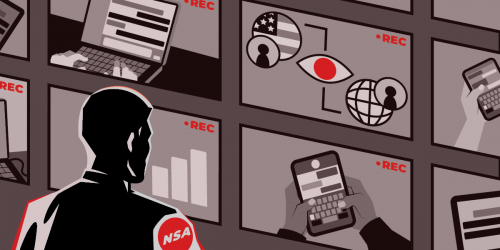Once-secret surveillance court orders obtained by EFF last week show that even when the court authorizes the government to spy on specific Americans for national security purposes, that authorization can be misused to potentially violate other people’s civil liberties.
These documents raise larger questions about whether the government can meaningfully protect people’s privacy and free expression rights under Section 702 of the Foreign Intelligence Surveillance Act (FISA), which permits officials to engage in warrantless mass surveillance with far less court oversight than is required under the “traditional” FISA warrant process.
The documents are the third and final batch of Foreign Intelligence Surveillance Court (FISC) opinions released to EFF as part of a FOIA lawsuit seeking all significant orders and opinions of the secret court. Previously, the government released opinions dealing with FISA’s business records and pen register provisions, along with opinions under Section 702.
Although many of the 13 opinions are heavily redacted—and the government withheld another 26 in full—the readable portions show several instances of the court blocking government efforts to expand its surveillance or ordering the destruction of information obtained improperly as a result of its spying.
Court Rejects FBI Effort to Log Communications of Individuals Not Targeted by FISA Order
For example, in a 40-page opinion issued in 2004 or 2005, FISC Judge Harold Baker rejected the FBI’s proposal to log copies of recorded conversations of people who, while not targeted by the agency, were still swept up in its surveillance. This likely occurred when innocent people used the same communications service as the FBI’s target, possibly a shared phone line. The opinion demonstrates both the risks of overcollection as part of targeted surveillance as well as the benefits of engaged, detailed court oversight.
Here’s how that oversight works: Once the FISC approves electronic surveillance under FISA’s Title I, the FBI can record a target’s communications, but it must follow “minimization procedures” to avoid unnecessarily listening in on conversations by others who are using the same “facility” (like a telephone line). In this case, however, the FBI employed a surveillance technique that apparently captured a lot of innocent communications. (This is often referred to as “incidental collection” because the recording of these conversations is incidental to spying on the target who uses the same phone line.)
Although redactions make it difficult to understand details of the FBI’s request to the court, it apparently sought to mark these out-of-scope conversations for later use, which would be inconsistent with the “Standard Minimization Procedures” approved for use in FISA Title I cases.
The FBI seems to have presented its request to the FISC as no big deal, with “minimal, if any” impact on the Fourth Amendment. Judge Baker saw it differently. He explained that “it is not sufficient to assert that, because the Standard Procedures already permit the FBI a great deal of latitude, it is reasonable to grant a little more.”
More fundamentally, the court took the FBI to task for the “surprising occasion” of seeking to expand its use of incidentally collected communications, rather than getting rid of them. It faulted the FBI for failing to account “for the possibility that overzealous or ill-intentioned personnel might be inclined to misuse information, if given the opportunity.” As the court put it, “the advantage of minimization at the acquisition stage is clear. Information that is never acquired in the first place cannot be misused.”
NSA Makes Ridiculous Argument to Keep Communications it Obtained Without Court Authorization
Other opinions EFF obtained detail the NSA’s unauthorized surveillance of a number of individuals and the government’s efforts to hold onto the data despite a FISA court’s order that the communications be destroyed.
A December 2010 order by FISC Judge Frederick Scullin, Jr. describes how over a period between 15 months and three years, the NSA obtained a number of communications of U.S. persons. The precise number of communications obtained is redacted.
Rather than notifying the court that it had destroyed the communications it obtained without authorization, the NSA made an absurd argument in a bid to retain the communications: because the surveillance was unauthorized, the agency’s internal procedures that require officials to delete non-relevant communications should not apply. Essentially, because the surveillance was unlawful, the law shouldn’t apply and the NSA should get to keep what it had obtained.
The court rejected the NSA’s argument. “One would expect the procedures’ restrictions on retaining and disseminating U.S. person information to apply most fully to such communications, not, as the government would have it, to fail to apply at all,” the court wrote.
The court went on to say that “[t]here is no persuasive reason to give the (procedures) the paradoxical and self-defeating interpretation advanced by the government.”
The court then ordered the NSA to destroy the communications it had obtained without FISC authorization. But another opinion issued by Judge Scullin in May 2011 shows that rather than immediately complying with the order, the NSA asked the FISC once more to allow it to keep the communications.
Again the court rejected the government’s arguments. “No lawful benefit can plausibly result from retaining this information, but further violation of law could ensue,” the court wrote. The court then ordered the NSA to not only delete the data, but to provide reports on the status of its destruction “until such time as the destruction process has been completed.”
If Government Abuse of Surveillance Powers Occurs With Careful Oversight, What Happens Under Section 702?
The new opinions show that even when the FISC judges actually approve targeted surveillance on particular individuals, the government still collects the contents of innocent people’s communications in ways that are incompatible with the law. Which raises the question: what is the government getting away with when it engages in surveillance that has even less FISC oversight?
Although the opinions discussed above concern FISA’s statutory requirements of minimization rather than constitutional limits, these are the sort of concerns that EFF has raised in the context of the NSA’s warrantless surveillance under Section 702 of FISA. Unlike FISA Title I, Section 702 does not require the FISC to conduct such detailed oversight of the government’s activities. The court does approve minimization procedures, but it does not review targets or facilities, meaning that it has less insight into the actual surveillance. That necessarily reduces opportunities to prevent overbroad collection or check an intelligence agency’s incremental loosening of its own rules. And, as we’ve seen, it has led to significant “compliance violations” by the NSA and other agencies using Section 702.
All surveillance procedures come with risks, especially with the level of secrecy involved in FISA. Nevertheless, opinions like these demonstrate that detailed court oversight offers the best hope of curtailing these risks. We hope it informs future debate in those areas where oversight is limited by statute, as with Section 702. If anything, the decisions are more evidence that warrantless surveillance must end.









